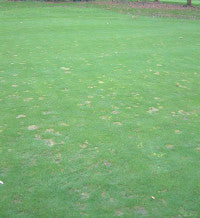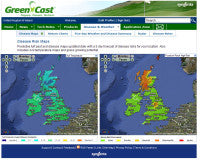High speed systemic suits cooling conditions
 The high speed systemic activity of Banner MAXX increases the chance for green keepers and turf managers to effectively prevent Fusarium damage as growing conditions slow down through the autumn. It has also proven especially effective for Leaf Spot control in stadium sports turf.
The high speed systemic activity of Banner MAXX increases the chance for green keepers and turf managers to effectively prevent Fusarium damage as growing conditions slow down through the autumn. It has also proven especially effective for Leaf Spot control in stadium sports turf.
Dry weather has limited the incidence of Fusarium Patch so far this autumn. But with soil temperatures now cooling, turf managers must be ready to apply fast acting Banner MAXX when the weather breaks, and the risk of disease attack rapidly rises.
"We have seen from trials and reports on irrigated turf that the Fusarium disease pathogen is already around," reports Dr Simon Watson of Syngenta. "When conditions become more conducive for the disease - with cooler, wetter weather - it could build up very rapidly," he warns.
"As soil temperatures fall below 10ºC, the fast acting systemic Banner MAXX will get into the plant quicker and start to tackle disease before it can break out into visible damage," advises Dr Watson. Furthermore, the systemic activity will continue to give disease protection after each cut, when a contact only fungicide will be quickly mown off and leave new growth unprotected.
With most of the active absorbed by the plant leaf within an hour of application, Banner MAXX is rapidly rainfast to increase spraying opportunities in wet autumn conditions, or where turf managers want to maintain irrigation of greens that could wash off some other fungicides.
"Even though the daytime temperatures may still reach 15ºC or more, the longer, cool nights mean that soil temperatures will decline. The activity of slower uptake systemic fungicides could be reduced through the latter part of the growing season," he adds. With turf growth slowing and the potential for recovery from disease attack is reduced through the autumn, it becomes imperative to proactively stop disease damage in order to maintain high quality playing surfaces through the winter.
Banner MAXX has proven to be especially effective when used in the spring and autumn, when turf is actively growing but conditions are cooler. Used in the autumn as part of a fungicide programme, the fast moving active - propiconazole - provides an alternative mode of action to summer strobilurin fungicides, before the use of contact Daconil Weather Stik through the winter.
Spot on for stadium diseases
 High humidity within sports stadiums creates the ideal conditions for Leaf Spot infections. Caused by a range of fungi, the pathogen Dreschlera siccans can prove especially damaging on Ryegrass playing surfaces, if initial spots melt out into larger patches. Weakened turf will be especially susceptible to wear as the playing season progresses and becomes more susceptible to further disease infection. Furthermore, infected and damaged turf looks unsightly under the spotlight of the TV cameras in modern stadia.
High humidity within sports stadiums creates the ideal conditions for Leaf Spot infections. Caused by a range of fungi, the pathogen Dreschlera siccans can prove especially damaging on Ryegrass playing surfaces, if initial spots melt out into larger patches. Weakened turf will be especially susceptible to wear as the playing season progresses and becomes more susceptible to further disease infection. Furthermore, infected and damaged turf looks unsightly under the spotlight of the TV cameras in modern stadia.
"Restricted air-flow in the stadium environment can increase humidity and temperature at the turf surface, especially for stadiums using artificial lighting rigs and irrigation," advises Dr Watson. "Leaf Spot problems will be worse if fertility is too high, and take care not to cut lower than the recommended heights for the specific turf species."
He adds that groundsmen using Banner MAXX have reported excellent results in stopping Leaf Spot from breaking out, with long-lasting control from early autumn applications.
For further Press Information please contact:
Dr Simon Watson
Syngenta Crop Protection
Tel: 01223 883441
Email: simon.watson@syngenta.com
For turf specific information visit the web site www.greencast.co.uk
